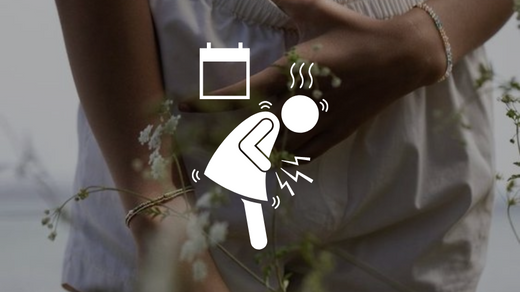Die kramp in je onderbuik, gevoelige borsten, een humeur om op te schieten, dingen uit je handen laten vallen, heel veel trek in lekkere zoete en vette snacks. De weegschaal geeft opeens een kilo meer aan en je hebt hoofdpijn. Ja ja, het is weer die tijd van de maand.
Vaak vinden we het heel normaal dat vrouwen ongemakken ervaren rondom de menstruatie. Bij veel vrouwen is het alleen wel erger dan alleen wat ongemakken. Als je meerdere van bovenstaande verschijnselen herkent, heb je waarschijnlijk last van PMS, het premenstrueel syndroom. PMS is een verzamelnaam voor een aantal lichamelijke en psychische symptomen die voorafgaand aan een menstruatie optreden. Tussen de 20 en 50% van de vrouwen in de vruchtbare leeftijd heeft een ernstige vorm van PMS. Deels wordt dit veroorzaakt door de schommelingen in de oestrogeen- en progestageenspiegels. De symptomen beginnen enkele uren tot twee weken voor de menstruatie en verdwijnen meestal gelijk erna.
Welke klachten kun je ervaren bij PMS?
De klachten kunnen al twee weken voor de menstruatie beginnen. Naast de lichamelijke klachten komen de volgende psychische klachten regelmatig voor: verwardheid, depressie, concentratieproblemen, opvliegendheid, emotionele overgevoeligheid en stemmingswisselingen. Veel vrouwen voelen zich niet begrepen met deze klachten. De omgeving reageert vaak lacherig op bovenstaande klachten voor of tijdens de menstruatie. Terwijl het je hartstikke in de weg kan zitten.
Veel artsen adviseren de anticonceptiepil te nemen en een dagboek met de klachten bij te houden. Voor velen is dit niet de oplossing.
Wat kun je zelf doen om je PMS-klachten te verminderen?
- Ontspan genoeg en vermijd stressoren. Cortisol is een van de hormonen die vrijkomt bij stress en brengt op de langere termijn een disbalans in je hormonen
- Beweeg voldoende
- Slaap voldoende
- Vermijd suiker en snelle koolhydraten
- Reguleer je bioritme want dit heeft veel invloed op je cyclus. De zon op je gezicht overdag en vermijd blauw licht in de avond, zoals tv, iPad en je telefoon.
- Zorg ervoor dat je je hormonen ondersteunt met goede voeding. Vooral gezonde vetten en eiwitten zijn belangrijk, omdat je hormonen hieruit opgebouwd zijn.
- Vermijd soja. Soja verandert de balans tussen oestrogeen en progesteron.
- Ondersteun een gezonde hormoonbalans met supplementen. Als jij wil weten welke supplementen jouw PMS klachten kunnen verminderen, adviseren wij een supplementenadvies bij een van onze therapeuten, zodat we heel gericht met je mee kunnen kijken!
- Zoek afleiding, ga wat doen waarvan jij nieuwe energie krijgt of waar je je lekker door ontspant. Verwen jezelf eens met een mooie bos bloemen in plaats van met een reep chocolade.
Wil je gericht aan de slag waarbij een orthomoleculair therapeut met je meekijkt? Plan dan een consult in.








